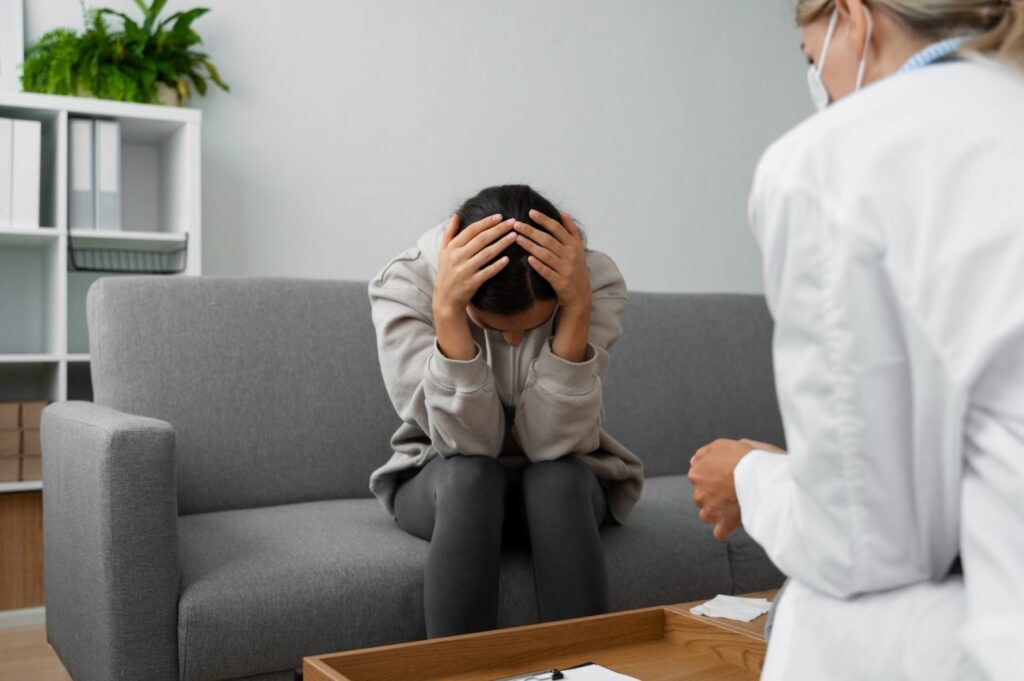Find & Seek Professional Psycho Therapy in Pennsylvani
Expert psycho-therapy in Pennsylvania: find professional mental health and psychiatric services to meet your unique needs.
Basically, mental health forms the essence of all our well-being. Seeking professional help, therefore, forms the very foundation necessary for dealing with mental health issues. People seek a wide range of mental health services in Pennsylvania, including psycho-therapy. In this article, the importance of psycho-therapy, types of psycho-therapy, how to find a qualified therapist, and what can be expected from the sessions will be discussed.
Understanding Psycho-Therapy In Pennsylvania
Psychotherapy, more popularly known as talk therapy, is a treatment method designed to help individuals work their way through emotional problems, psychological issues, and problems regarding behavior. It consists of a qualified mental health professional, usually a psychiatrist, psychologist, or licensed clinical social worker who talks with the client to uncover underlying problems, develop strategies to cope, and foster growth.
The Importance of Psycho-Therapy In PA
Psycho therapeutic support is indicated in regard to the safe space that is created where individuals can share their feelings, concerns, and thoughts without them being found guilty. This is important in helping the individual overcome stress, anxiety, depression, and other emotional disturbances.
Self-Understanding: Psycho therapy helps an individual understand why they feel and act in certain ways. These new self-insights enable the individual to develop a more reasonable understanding of themselves, which enhances personal growth and improvement in interpersonal relationships.
Coping Mechanisms: Therapists provide the person with different tools and ways to deal with one’s emotions and use them positively when confronting life’s daily challenges. This may also involve coping skills for stress, management of anxiety, and conflict resolution.
Behavioral Change: Psycho-therapy helps an individual to recognize certain self-destructive behaviors or thought patterns. Knowing these root causes should help them change to healthier ones.

Types of Psycho Therapy Available in Pennsylvania
Approaches to psychotherapy in Pennsylvania have their take on how each type is tailored to the needs of different clients. They include:
1. Cognitive Behavioral Therapy
CBT is one of the most applied psychotherapeutic approaches aimed at recognizing and changing one’s negative thought and behavioral patterns. It proves quite efficient in the treatment of anxiety disorders, depression, and stress-related problems. Many freelance therapists in Pennsylvania are involved in offering such services to equip their clientele with relevant skills pertaining to mental health.
2. Dialectical Behavior Therapy
It was originally developed for borderline personality disorder patients. DBT integrates cognitive-behavioral techniques with mindfulness skills. Client emotional regulation, interpersonal efficiency, and distress tolerance are its mainstays. Generally speaking, it is becoming increasingly considered beneficial for a wide range of mental health conditions.
Psychodynamic Therapy
Psychodynamic therapy examines the unconscious mind to find out how earlier life events may shape a patient’s current behavior. This is particularly helpful for patients who wish to gain more insight into their feelings and relationships. Many psychodynamic therapists in Pennsylvania use the therapeutic relationship to help patients explore these dynamics.
4. Humanistic Therapy
Humanistic therapy is non-directive, using personal growth and self-actualization. The nature of this intervention places its emphasis on the premise that people have an inherent capability to achieve improvement and fulfillment. Humanistic therapists in Pennsylvania offer an environment wherein the clients can explore their emotions and aspirations.
5. Family and Couples Therapy
Family and couples therapy involves relational dynamics between families or romantic relationships. This is helpful in the development of good communication, conflict resolution, and healthier relationships. Many therapists work with families and couples in Pennsylvania to help overcome problems and solidify relationships.
Finding Professional Psycho Therapy in Pennsylvania
Finding the appropriate psychotherapist can be quite a daunting process; however, by knowing your needs and what’s available in terms of resources, you are perfectly able to search out the help you need.
1. Research and Referrals
Begin your search for psycho-therapy in Pennsylvania by asking trusted sources such as friends, family, or a primary care physician to recommend someone. Personal referrals can sometimes give one a sense about how a therapist works and the type of therapy she or he may engage in. You can also research online regional mental health clinics, hospitals, and private psycho therapy practices.
2. Go Online and Directories
Multiple online directories and resources list the licensed psycho-therapists in Pennsylvania. Online directories like Psychology Today, TherapyDen, and GoodTherapy provide the facility of filtering results based on location, specialty, and insurance acceptance. These websites have profiles of therapists that include specialties, the modality of their therapeutic work, and reviews from clients.
3. Check Credentials
In selecting the therapist, check his licensure and credentials. Therapist licensure in Pennsylvania can be one of these varieties: LPC, LCSW, or Licensed Psychologist. Whomever you select should possess qualifications and experience relevant to your needs.
4. Setup a Consultation
Many therapists offer initial consultations, which might be a great opportunity to dip one’s feet in the water for compatibility. Here is the time when you can ask them about their approach, experience with particular problems you are struggling with, and treatment philosophy. Remember that trust develops around instinctive feelings-and a good therapeutic alliance is key to successful therapy.
5. Consider Accessibility and Convenience
Accessibility is a very important basis on which one needs when seeking a therapist. Consider location, availability, and if one has to travel for an in-office session or whether the therapist offers teletherapy from the comfort of one’s home. With the advancement of technology, most of those therapists based in Pennsylvania offer e-sessions.
Knowing what will take place within your psychotherapy will have the effect of relaxing you and dispelling a lot of anxiety that might be harbored about the whole process. The explanations below are a breakdown of what usually takes place in therapy.
1. Initial Assessment
This is usually done during your first session, when the therapist requests background information, history of the mental health problem being addressed, and the immediate concern. This aids the therapist in understanding your needs and develops an appropriate treatment plan.
2. Goal Setting
Treatment is a collaborative process. After the assessment, you and your therapist will determine what you would want to achieve from the therapy. These goals can include anything from the management of symptoms, working on improving relationships, or increasing coping skills.
3. Regular Sessions
Most of the therapy is done in regular sessions, which usually take 45 to 60 minutes. Within these sessions, you are able to share your thoughts and feelings and describe your experiences. At this point, the therapist may lead the conversation or provide you with exercises and techniques that could help you understand your concerns better.
4. Homework and Exercises
Homework or exercises are other ways many therapists try to help you reinforce concepts explored in the sessions. These may include journaling, practicing coping strategies, or working through specific exercises that will help you build skills outside of therapy.
5. Evaluation of Progress
You and your therapist will regularly review progress throughout treatment with respect to the realization of your goals. Continuous monitoring and review allow one to modify their treatment plan when necessary and give oneself reasons to applaud their successes.
Overcoming Obstacles to Psycho Therapy
While seeking psycho therapy can be one of the most rewarding, beneficial, and enlightening experiences ever, some individuals confront barriers in their effort to access these facilities. Below are common challenges and possible solutions.
1. Stigma Relating to Mental Health
The stigma associated with mental health issues can be a deterrent for seeking help. It should be understood that seeking therapy is not only a healthy method of strengthening oneself, but also an important pro-active step for health. Educating yourself and others about mental health lowers the stigma within your community.
2. Cost and Insurance Coverage
Cost remains one of the most vital elements standing in the way of psycho-therapy amongst people. Mental health services may come under insurance plans; however, that again varies. It is pretty essential that one reviews their insurance policy and sees who is in-network. Sliding scale fees are also sometimes offered based on income by some therapists.
3. Time Constraints
The busy schedule, perhaps, of all the reasons can be the most hindering to go into therapy. Remind yourself to contact your therapist and book sessions at times that are suitable for you-even if it means lunch breaks, evening, or weekend times. In the light of this, most therapists nowadays are willing and accommodate flexible scheduling and teletherapy services to suit their clients’ needs.
4. Fear of Vulnerability
Opening up to personal struggles can very well be intimidating. Remember, all therapists are professionally trained, and offering a supportive and non-judgmental environment. Sometimes, a good therapeutic relationship may allow trust and further vulnerability to be established.
Psycho-therapy in Pennsylvania is an important first step to furthering your mental health and well-being. By learning about the different types of therapies available, how to find a good therapist, and what to expect from a session, you will be on your merry way with self-discovery and healing. Remember, taking care of your mental health is one of the most courageous and empowering things you can do, and help is always within reach.
Ready to explore psycho-therapy options in Pennsylvania? Reach out today and connect with a qualified therapist. Your mental health does matter, and it could mean a more brilliant and fulfilling future ahead.
Frequently Asked Questions about Psycho Therapy in Pennsylvania
Psycho-therapy in Pennsylvania is a vital service that can be provided to those who desire mental health support. Below are some of the frequently asked questions to help you understand more about the process:
What is psycho-therapy?
Psycho-therapy is a mode of treatment that helps the patient deal with the psychiatric condition, emotional concerns, and behavioral problems by communicating with a licensed professional.
Who Should Receive Psycho-therapy?
Any person in Pennsylvania distressed with anxiety disorder, depression, trauma, or marital issues should seek psycho-therapy.
Their frequency depends on your needs. Some clients of mine need or prefer weekly sessions, while some get away with biweekly or even monthly meetings.
How can I get started?
The beginning must be made by contacting a licensed psychiatrist or mental health professional. Any licensed professional throughout the state of Pennsylvania can be contacted to initiate your journey toward mental health.
